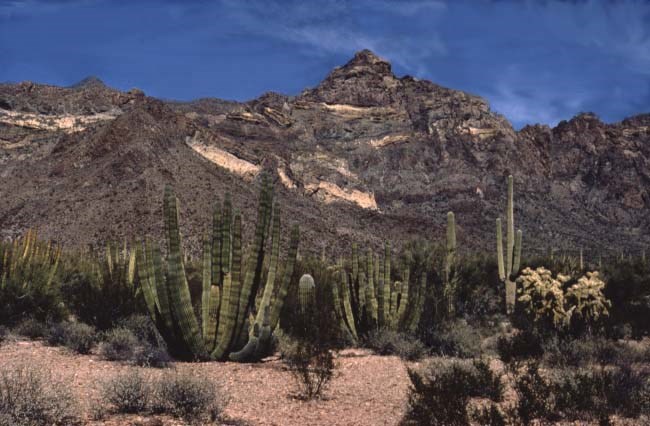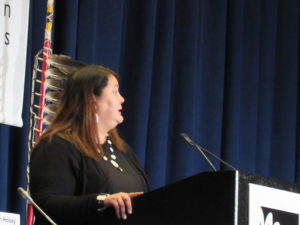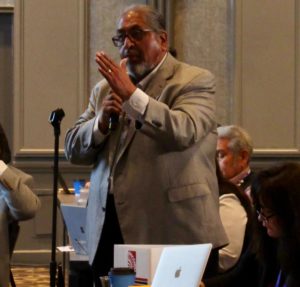
- Details
- By Levi Rickert
WASHINGTON — Assistant Secretary of the Interior for Indian Affairs Tara Sweeney had just finished her update to the National Congress of the American Indians when she was confronted during the question-and-answer period by tribal leaders about the Trump administration’s insensitivity to American Indian issues.
 Tara Sweeney - Native News Online photo
Tara Sweeney - Native News Online photo
After a tense exchange with members of the Mashpee Wampanoag Tribe about the ongoing land-in-trust battle with the Dept. of Interior, the chairman of another tribe addressed Sweeney about the Trump administration’s handling of another issue that has been making headlines.
Chairman Ned Norris Jr. of the Tohono O’odham Tribe stood to let Sweeney know about his displeasure with the U.S. Customs and Border Protection blasting sacred sites for Trump’s border wall on ancestral homelands of his Tribe.
"They desecrated those human remains that were there," Chairman Norris said. "You have an obligation to protect sacred sites and sacred areas and religious areas for Native American people. You have failed to make sure...I call on you to exercise your responsibility and stop the destruction of sacred sites of Native American communities."
Sweeney simply thanked the tribal chairman for his comments.
 Tohono O'odham Chairman Ned Norris Jr. Photograph by Levi Rickert
Tohono O'odham Chairman Ned Norris Jr. Photograph by Levi Rickert
Chairman Norris was referring to construction crews recently blasting sacred burial sites along Monument Hill at Organ Pipe Cactus National Monument.
Not only is the Organ Pipe Cactus National Monument sacred to the Tohono O’odham Nation, but the area has been designated as a biosphere reserve by the United Nations because it is full of rare plants and animals.
The blasting caught the attention of Rep. Raúl M. Grijalva (D-Ariz.), whose district includes the reservation. On January 7, 2020, he sent a letter expressing his concern about the lack of tribal consultation with the Tohono O'odham Nation. He visited the construction zone last month.
"At the end of this month we're holding a hearing to deal with this issue," Grijalva told KVOA, the ABC-affiliate in Tucson. "Homeland Security on the next day will also hold a hearing on the issues of accountability for the agency and why this occurring."
More Stories Like This
Native News Weekly (August 25, 2024): D.C. BriefsUS Presidents in Their Own Words Concerning American Indians
Native News Weekly (December 14, 2025): D.C. Briefs
Wounded Knee Massacre Site Protection Bill Passes Congress
Two Murdered on Colville Indian Reservation
Help us defend tribal sovereignty.
At Native News Online, our mission is rooted in telling the stories that strengthen sovereignty and uplift Indigenous voices — not just at year’s end, but every single day.
Because of your generosity last year, we were able to keep our reporters on the ground in tribal communities, at national gatherings and in the halls of Congress — covering the issues that matter most to Indian Country: sovereignty, culture, education, health and economic opportunity.
That support sustained us through a tough year in 2025. Now, as we look to the year ahead, we need your help right now to ensure warrior journalism remains strong — reporting that defends tribal sovereignty, amplifies Native truth, and holds power accountable.
 The stakes couldn't be higher. Your support keeps Native voices heard, Native stories told and Native sovereignty defended.
The stakes couldn't be higher. Your support keeps Native voices heard, Native stories told and Native sovereignty defended.
Stand with Warrior Journalism today.
Levi Rickert (Potawatomi), Editor & Publisher

